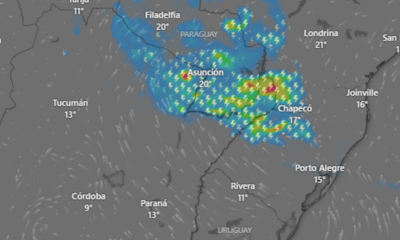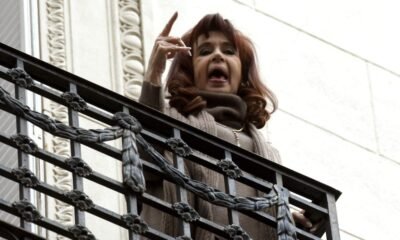INTERNACIONAL
Trump threatens to bomb Iran unless they end nuclear weapons program and begin talks on new deal
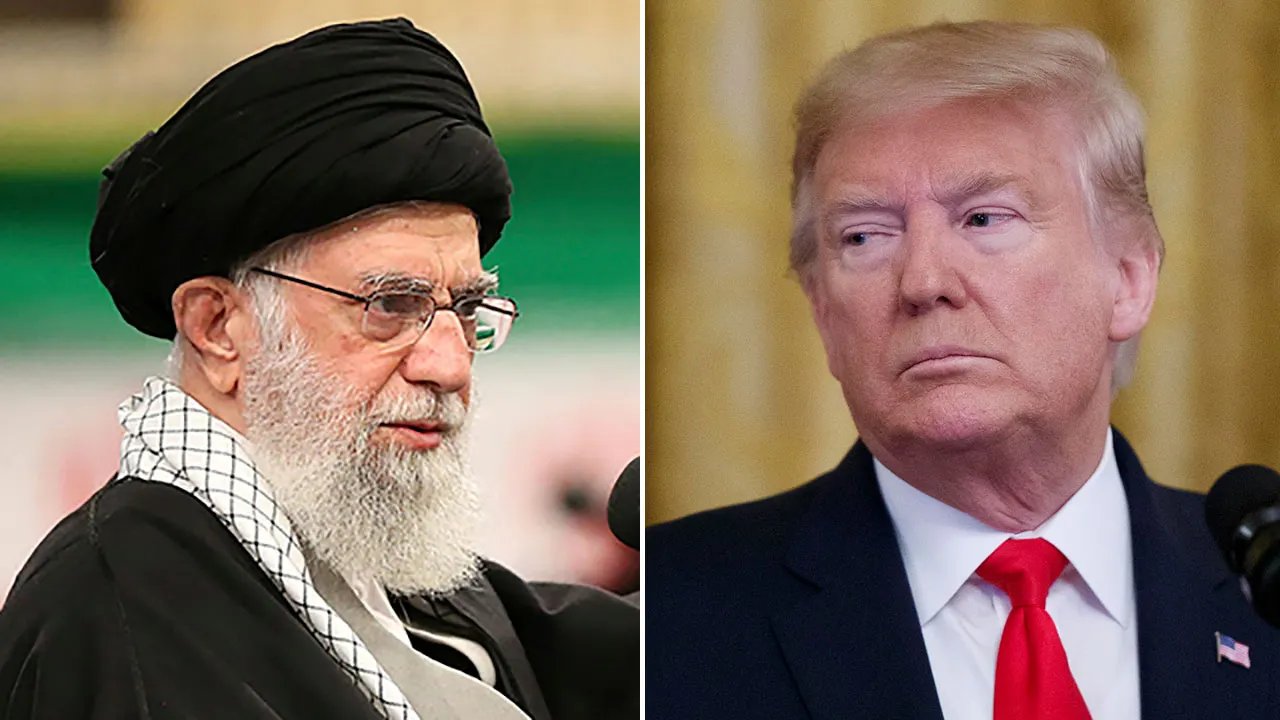
JERUSALEM—President Donald Trump’s overtures via a letter to the Islamic Republic of Iran’s supreme leader, Ali Khamenei, to jump-start talks on dismantling Tehran’s illicit nuclear weapons program, were met with rejection by the theocratic state on Sunday, following Trump’s latest threat to the regime.
Trump told NBC on Saturday that «If they don’t make a deal, there will be bombing,» he said. «But there’s a chance that if they don’t make a deal, that I will do secondary tariffs on them like I did four years ago.»
Trump added the U.S. and officials from the Islamic Republic are «talking.»
Iran’s President Masoud Pezeshkian said on Sunday «We don’t avoid talks; it’s the breach of promises that has caused issues for us so far,» according to the Associated Press. He added, «They must prove that they can build trust.» The White House did not immediately respond to Iran’s rejection of the talks, the AP reported.
Pezeshkian still noted that in Iran’s response to the letter that indirect negotiations with the Trump administration were still possible.
WALTZ TELLS IRAN TO GIVE UP NUCLEAR PROGRAM OR ‘THERE WILL BE CONSEQUENCES’
Supreme Leader Ali Khamenei addresses the media during elections in Tehran, Iran, on May 10, 2024. (Fatemeh Bahrami/Anadolu via Getty Images)
The apparent return of Iran’s regime to its standard playbook of opaque indirect talks between the U.S. and Tehran’s rulers raises questions about whether Trump would greenlight military strikes to eradicate Iran’s vast nuclear weapons program.
After Iran launched two massive missile and drone attacks on Israel last year, Trump could also aid the Jewish state in knocking out Iran’s nuclear weapons apparatus.
Indirect talks between the U.S. and the world’s worst state-sponsor of terrorism, according to Democratic and Republican administrations, have not compelled Iran to abandon its pursuit of nuclear weapons.
Jason Brodsky, the policy director of United Against Nuclear Iran (UANI), told Fox News Digital that the Iranians «do not want to provide President Trump with a casus belli to strike Iran’s nuclear program. There may be indirect and non-public responses through various intermediaries. I think some Iranian officials perceive a fissure among President Trump’s national security team on Iran. This explains Iran’s foreign minister’s comment in recent days that President Trump’s letter to the supreme leader poses challenges as well as opportunities.»
TRUMP VINDICATED AS EXPLOSIVE REPORT CONFIRMS IRAN SUPERVISES HOUTHI ‘POLITICAL AND MILITARY AFFAIRS’

Iran’s first functioning nuclear power plant in Bushehr, Iran, on April 28, 2024. (Morteza Nikoubazl/NurPhoto via Getty Images)
Brodsky said, «These Iranian officials seek to bypass experienced hands like President Trump’s national security advisor and secretary of state, who have been demanding the dismantlement of Iran’s entire nuclear program in keeping with President Trump’s long-standing and rightful position on this issue, and cultivate individuals around President Trump who do not have experience with Iran or are considered non-traditional conservatives who would be more receptive to their entrees.»
Trump promised that «bad things» would happen to Iran if the regime does not come to the table for nuclear negotiations. «My big preference is that we work it out with Iran, but if we don’t work it out, bad things are gonna happen to Iran,» he said on Friday.
Iran is enriching uranium to 60%, just shy of the 90% weapons-grade. Experts say it could have a nuclear weapon within weeks if it were to take the final steps to building one. Fox News Digital reported in late March that Iran’s regime has enriched enough uranium to manufacture six nuclear weapons, according to a U.N. atomic agency report.
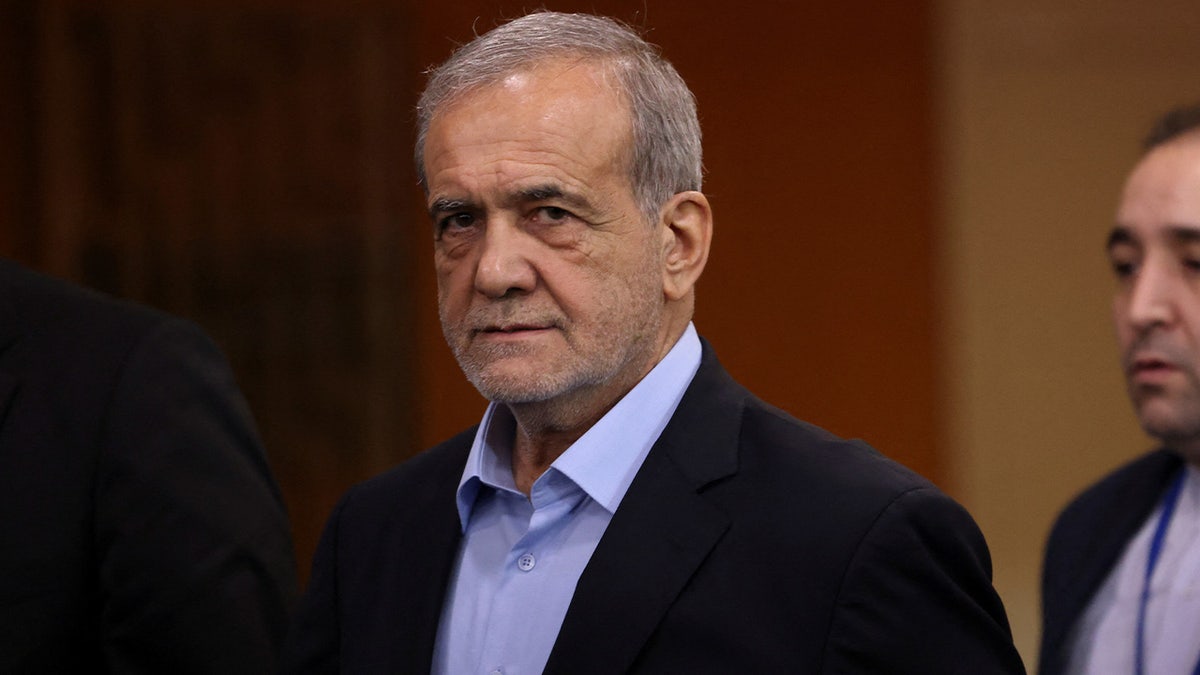
Iran’s President Masoud Pezeshkian at U.N. headquarters in New York, Sept. 24, 2024. (Reuters/Caitlin Ochs)
Alireza Nader, an Iranian-American expert on Iran, told Fox News Digital, «Khamenei may be signaling that he’s not interested in negotiations, but his regime desperately needs economic relief. Otherwise, another popular uprising against him could start. Khamenei doesn’t have the cards.»
There is widespread discontent among Iranians against the rule of 85-year-old Khamenei.
TRUMP REINSTATES ‘MAXIMUM PRESSURE’ CAMPAIGN AGAINST IRAN
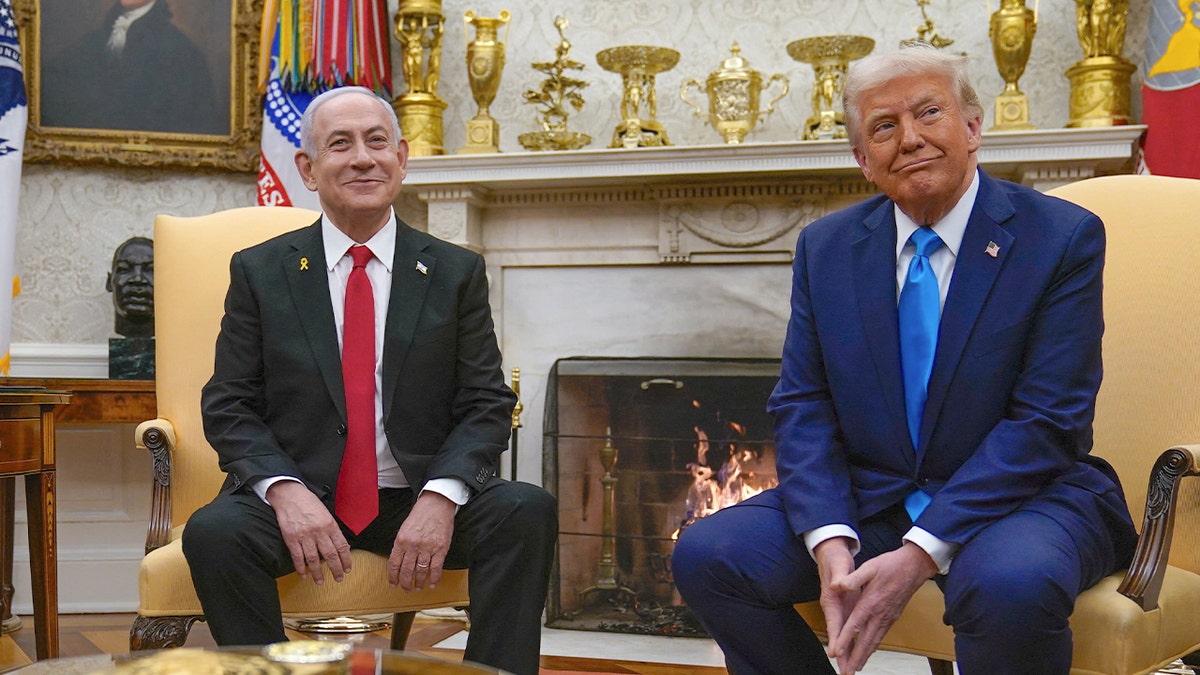
President Donald Trump and Israeli Prime Minister Benjamin Netanyahu meet at the White House, Feb. 4, 2025. (Reuters/Elizabeth Frantz)
Iran’s has upped the ante ever since Trump told FOX Business he sent a letter to Khamenei. Iran has disclosed video footage of its underground «missile city.»
Trump also told FOX Business, «I would rather negotiate a deal.»
He continued, «I’m not sure that everybody agrees with me, but we can make a deal that would be just as good as if you won militarily. But the time is happening now, the time is coming up.
«Something is going to happen one way or the other. I hope that Iran, and I’ve written them a letter, saying I hope you’re going to negotiate because if we have to go in militarily, it’s going to be a terrible thing for them.»
Brodsky said, «That means the Islamic Republic may dangle a JCPOA-like deal, with minor modifications from the previous 2015 agreement. Iranian media has been hyping such an arrangement.»
In 2018, Trump withdrew from the Obama-negotiated Joint Comprehensive Plan of Action deal because, he argued, that the agreement failed to ensure Iran would not build nuclear weapons and did not codify restrictions against Tehran’s missile program and sponsorship of Islamist terrorism.
IRAN’S LEADER WARNS US COULD RECEIVE ‘SEVERE SLAPS’ FOLLOWING TRUMP’S THREATS TO HOUTHIS

The Foundation for Defense of Democracies has analyzed where Iran’s nuclear infrastructure is located. (Image provided by the Foundation for Defense of Democracies (FDD) )
Brodsky said, «These Iranian officials believe they can lure the Trump administration into this arrangement and then President Trump will wave a magic wand and bring the entire Republican Party along with Democrats to support the deal and make it more politically durable than the 2015 JCPOA. This is all despite President Trump’s consistent and strong record in rejecting the JCPOA framework. It reflects desperation in Tehran and a desire to buy time with another failed diplomatic gambit. But it’s important to have eyes wide open here as to the games the Iranians will (and are already) playing.»
While Trump’s director of national intelligence, Tulsi Gabbard, testified on Tuesday before the Senate Intelligence Committee that the intelligence community «continues to assess that Iran is not building a nuclear weapon and Supreme Leader Khamanei has not authorized the nuclear weapons program he suspended in 2003,» she did note that Iran increased its enriched uranium stockpile.
In sharp contrast to U.S. intelligence since 2003, Fox News Digital has previously reported that European intelligence agencies believe Iran is working toward testing an atomic weapon, and sought illicit technology for its nuclear weapons program.
Counter-proliferation experts, like the prominent physicist and nuclear specialist David Albright, have told Fox News that European intelligence institutions use an updated definition of construction of weapons of mass destruction to assess Iran’s progress in contrast to America’s alleged obsolete definition.
CLICK HERE FOR THE FOX NEWS APP
Fox News Digital sent press queries to the U.S. State Department and the National Security Council.
Fox News Digital’s Morgan Phillips and the Associated Press and Reuters contributed to this report.
INTERNACIONAL
Un hallazgo arqueológico en Odesa revela secretos griegos y medievales bajo la Escalera Potemkin
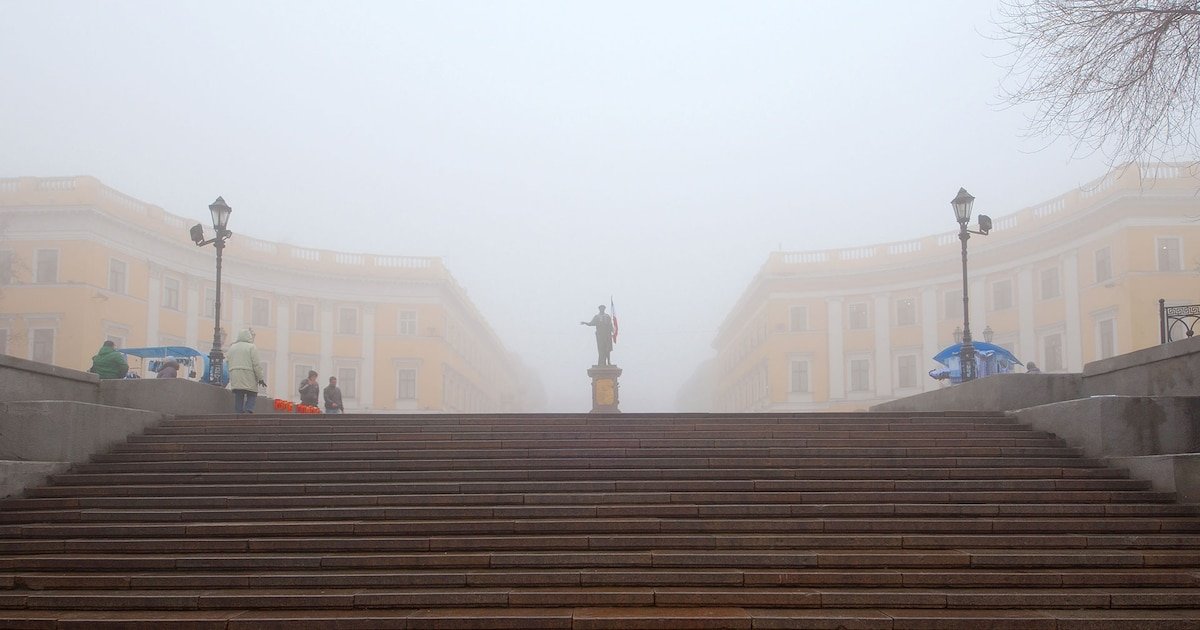
Grosby
La excavación en el centro de Odesa ha revelado que los muros de una antigua batería costera, hallados junto al acantilado original, contenían materiales incrustados del siglo V a. C., lo que sugiere que el puerto ya era un asentamiento griego mucho antes de la llegada de los otomanos y los rusos.
Este hallazgo, que conecta la historia de la ciudad con sus raíces más remotas, se suma a una serie de descubrimientos recientes que, según la información difundida por los equipos arqueológicos, ilustran la compleja y cosmopolita trayectoria de la urbe portuaria del Mar Negro.
Investigadores de la Universidad Pedagógica Nacional del Sur de Ucrania y el Instituto de Arqueología de la Academia de Ciencias confirman que, por un lado, la localización de vestigios de la fortaleza genovesa del siglo XIV, conocida como castillo de Ginestra; por otro, la identificación de los restos del Castillo de Hadzhibey, cuya ubicación exacta había sido motivo de debate durante casi dos siglos.
El primer hallazgo, el del castillo de Ginestra, arroja luz sobre la influencia de la República de Génova en la región. Desde el siglo XI, Génova consolidó su poderío naval y comercial, estableciendo una red de enclaves estratégicos en el Mar Negro, entre ellos la colonia de Gazaria en la actual Crimea, que mantuvo desde el siglo XIII hasta finales del siglo XV. Los restos de la fortaleza genovesa aparecieron en la plaza situada en lo alto de la Escalera Potemkin, un lugar emblemático inmortalizado en el filme El acorazado Potemkin (1925).
Esta zona, además, alberga la estatua de bronce del duque de Richelieu, quien, designado gobernador por el zar Alejandro I a comienzos del siglo XIX, impulsó la transformación de Odesa de una aldea a una ciudad moderna.
El segundo descubrimiento, centrado en el Castillo de Hadzhibey, ha resuelto una incógnita histórica que inquietaba a los arqueólogos locales. Tras la conquista otomana de la región en 1480, la fortaleza fue reconstruida y se convirtió en escenario de disputas entre los imperios ruso y otomano.

En 1789, durante la guerra ruso-turca, las tropas rusas destruyeron el castillo y reutilizaron sus materiales para nuevas construcciones. La falta de restos visibles y de documentación cartográfica o escrita del siglo XIX había dificultado la localización precisa del sitio, lo que alimentó la controversia durante generaciones.
La excavación permitió identificar los muros frontal y lateral de la batería costera que unía el castillo con la línea de costa. Su posición, próxima al antiguo acantilado, ofrecía a sus ocupantes una ventaja estratégica sobre el puerto de Odesa. El yacimiento contenía carpintería desmontada, capiteles de época otomana y escombros del siglo XVIII, todos ellos testigos materiales de la destrucción del castillo.
Los arqueólogos comprobaron que la disposición de los restos coincidía con el último diagrama conocido de la fortaleza, elaborado en la década de 1760. No obstante, el análisis de los materiales reveló que el muro de la batería era anterior a la presencia rusa y otomana, ya que incluía fragmentos del siglo V a. C., lo que remite a la existencia de un asentamiento griego en la zona.
Los intentos más recientes de localizar el Castillo de Hadzhibey se remontan a 2021, cuando los investigadores recurrieron a un georradar para examinar el subsuelo del centro de Odesa. Los resultados obtenidos entonces indicaban que la búsqueda avanzaba en la dirección correcta, pero la invasión a gran escala de Ucrania por parte de Rusia interrumpió los trabajos hasta junio de este año. La reanudación de las excavaciones ha permitido finalmente desvelar la ubicación y la historia de una de las fortificaciones más enigmáticas de la ciudad.
La superposición de capas históricas en el yacimiento, desde la presencia griega hasta la destrucción otomana y rusa, ofrece una visión única de la evolución de Odesa como enclave estratégico y crisol de culturas. La plaza donde se hallaron los restos, junto a la Escalera Potemkin y la estatua del duque de Richelieu, se confirma así como un punto neurálgico en la memoria urbana, donde convergen los vestigios de fortalezas medievales, colonias comerciales y episodios bélicos que han marcado el destino de la ciudad.
architectural,architecture,art,background,blue,boulevard,bronze,building,cardinal,charming,city,classical,classicism,culture,de,design,duc,duke,europe,european,exterior,famous,governor,historic,historical,history,house,landmark,masterpiece,monument,morning,new,odessa,old,pedestal,richelieu,sculpture,sightseeing,sky,square,stairs,statue,street,style,tour,tourism,ukraine,view,windows
INTERNACIONAL
Trump confirms 2 nuclear submarines are ‘in the region’ to counter Russia
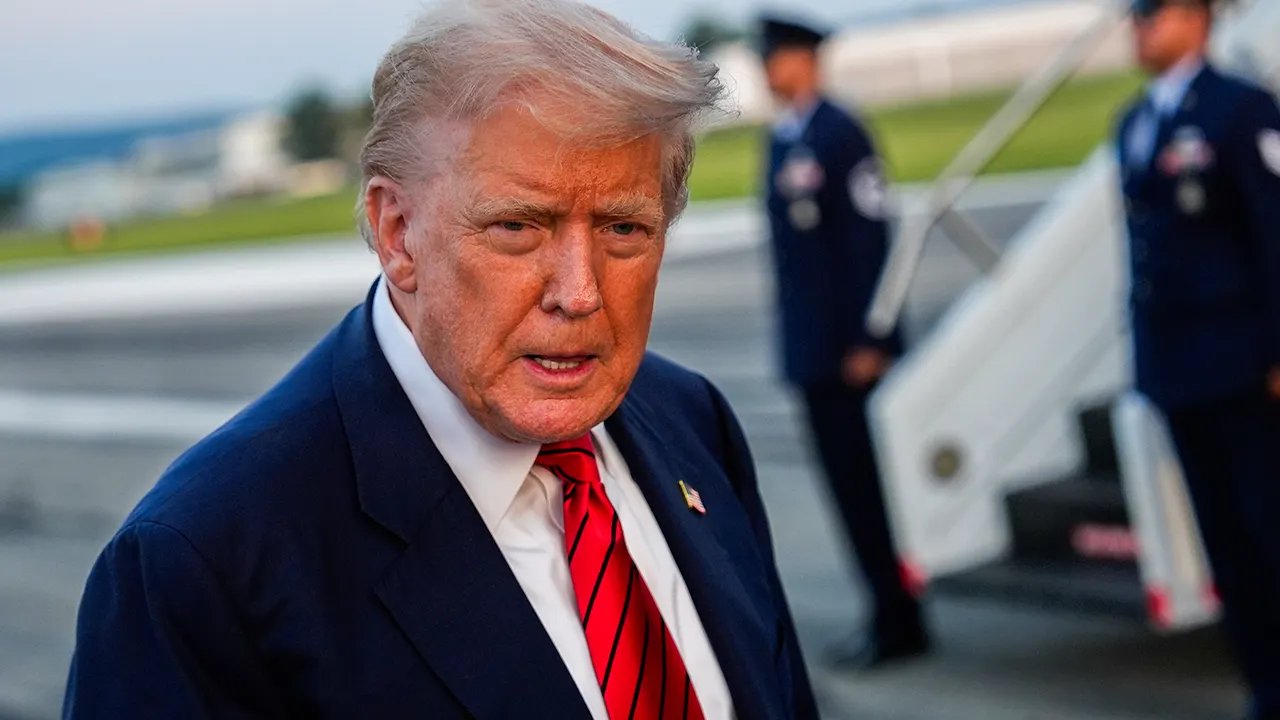
NEWYou can now listen to Fox News articles!
President Donald Trump told reporters on Sunday that nuclear submarines he ordered to counter Russia are now «in the region» ahead of U.S. special envoy Steve Witkoff’s visit.
Before boarding Air Force One in Allentown, Pa., to return to Washington, D.C., Trump was asked if the nuclear submarines had already been deployed to «face Russia.» Trump said on TRUTH Social on Friday that he ordered two nuclear submarines «to be positioned in the appropriate regions» in response to what he considered «highly provocative statements» from former Russian president Dmitry Medvedev about potential war with the U.S.
«I’ve already put out a statement and the answer is they are in the region, yeah, where they have to be,» Trump told reporters at Lehigh Valley International Airport on Sunday.
Trump said that Witkoff is expected to travel to Russia on «Wednesday or Thursday.» Russian state media reported Monday that Witkoff would arrive on Wednesday. The visit comes ahead of the Friday deadline Trump set for Russian President Vladimir Putin to reach a ceasefire agreement with Ukraine or face additional sanctions and tariffs. Trump also has warned about potential secondary tariffs for the purchasers of Russian energy.
TRUMP BRUSHES BACK RUSSIA’S MEDVEDEV AFTER ‘WAR’ WARNING: ‘WATCH HIS WORDS’
President Donald Trump speaks with reporters before boarding Air Force One at Lehigh Valley International Airport, Sunday, Aug. 3, 2025, in Allentown, Pa. (AP Photo/Julia Demaree Nikhinson)
«Well, there’ll be sanctions, but they seem to be pretty good at avoiding sanctions. You know, they’re wily characters, and they’re pretty good at avoiding sanctions,» Trump told reporters in front of Marine One. «So we’ll see what happens.»
Asked about Witkoff’s message to Moscow and if there’s anything the Russians can do to avoid sanctions, Trump said Sunday, «Yeah, get a deal where people stop getting killed.»
«A tremendous number of Russian soldiers have been killed. And likewise Ukraine, a lower number, but still thousands and thousands of people. And now we’re adding towns where they’re being hit by missiles. So it’s a lot of people being killed in that ridiculous war,» Trump said. «We stopped a lot of countries from war, India and Pakistan, we stopped a lot of countries. And we’re going to get that one stopped too. Somehow. We’re going to get that one stopped. That’s a really horrible war.»
«This should be the easiest to stop, and it’s not,» Trump added.
Before ordering the deployment of nuclear submarines last week, Trump had warned Medvedev, the deputy chairman of Russia’s Security Council, to «watch his words.» Medvedev had complained that Trump had shortened the Russia-Ukraine ceasefire deadline from 50 days to just 10 to 12 days, saying that the «ultimatum» was threat toward war «not between Russia and Ukraine, but with his own country.»
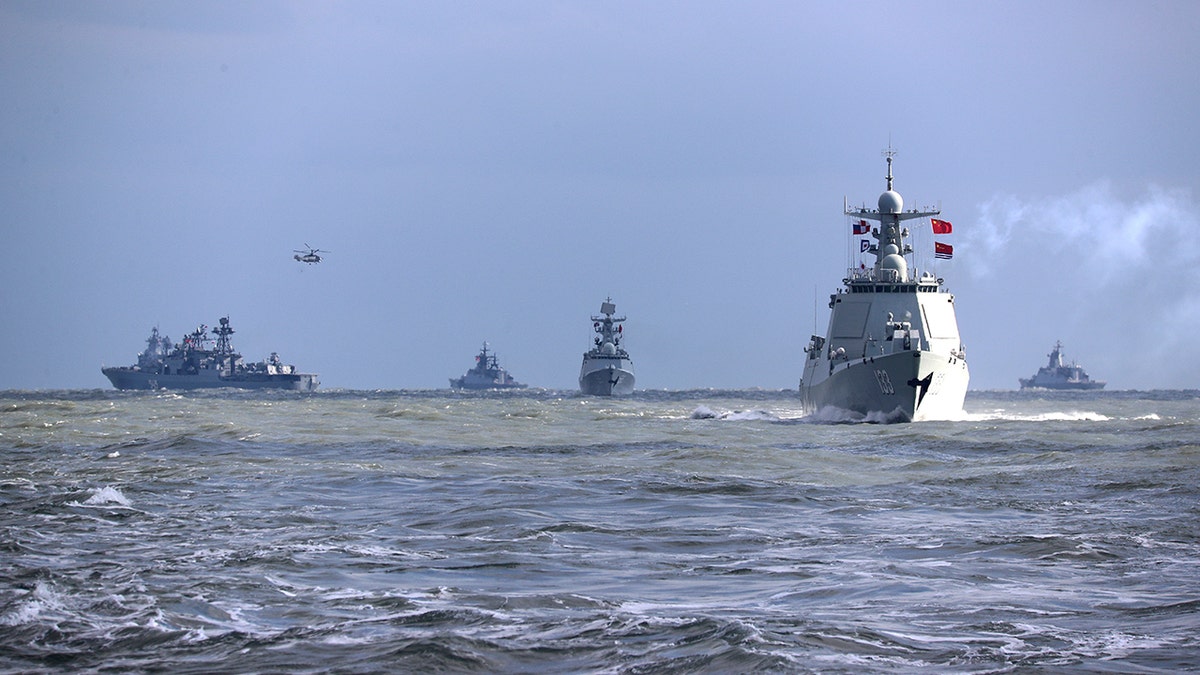
In this photo released by Xinhua News Agency, Chinese and Russian warships take part in a joint naval drills in the East China Sea, Dec. 27, 2022. (Xu Wei/Xinhua via AP, File)
Despite Trump cautioning that Medvedev was entering «dangerous territory,» the Russian official doubled down and referenced Russia’s «Dead Hand» – the Cold War-era automated nuclear retaliation system developed by the Soviet Union.
The U.S. and Russia hold the largest nuclear arsenals in the world.
Top Kremlin spokesman Dmitry Peskov reportedly downplayed the U.S. deployment of nuclear submarines Monday. He told reporters that «American submarines are already on combat duty – that’s a constant process» and the Russians «don’t believe this is a case of any sort of escalation,» according to the Russian-language news website Meduza.
Asked about Medvedev’s remarks, Peskov said members of the leadership in any country have different views but stressed Putin definitively decides Russian foreign policy.
«We approach any statements related to nuclear issues with great caution,» Peskov added at the press conference, according to The Moscow Times. «Russia is firmly committed to nuclear non-proliferation, and we believe that all parties should exercise the utmost restraint when it comes to nuclear rhetoric.»
TRUMP ANNOUNCES 25% TARIFF ON INDIA, SLAMMING ‘OBNOXIOUS’ TRADE BARRIERS, RUSSIA MILITARY AND ENERGY BUYS
Meanwhile, Beijing and Moscow have deepened their ties in recent years, with China providing an economic lifeline to Russia in the face of Western sanctions over the 2022 invasion of Ukraine.
Russia and China have started mock combat drills and other war games in the Sea of Japan, The Telegraph reported. Citing a statement from the Chinese Defense Ministry, the newspaper said the three-day exercise involves four Chinese vessels, including the guided-missile destroyers Shaoxing and Urumqi, and entails «submarine rescue, joint anti-submarine, air defense and anti-missile operations, and maritime combat,» as well as naval patrols in «relevant waters of the Pacific.»
At a press conference announcing details of the annual drills last week, Chinese Defense Ministry spokesperson Zhang Xiaogang said the Joint Sea 2025 exercise would be held in the air and seas near the Russian port city of Vladivostok, positioned across the sea from Japan’s west coast. Last year, the drill was held off southern China in the South China Sea.
«This is an arrangement within the annual cooperation plan between the Chinese and Russian militaries. It is not targeted at any third party, nor is it related to the current international and regional situation,» Zhang said.
China and Russia also signed a «no-limits» economic partnership shortly after the war in Ukraine began.
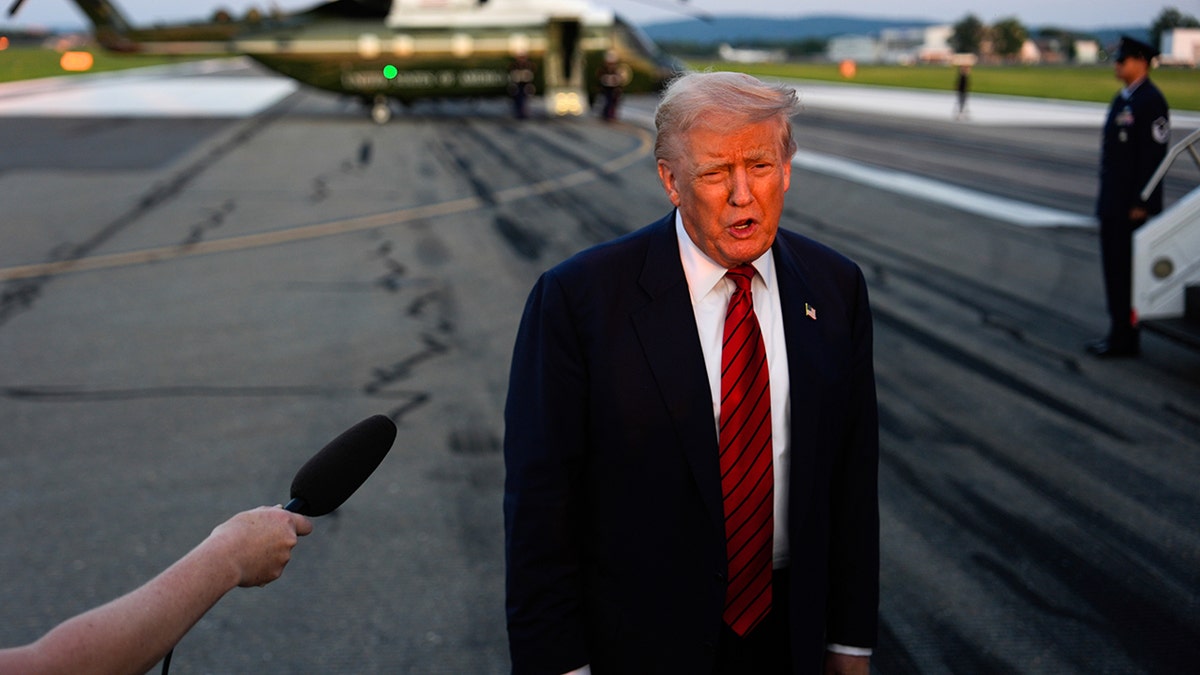
President Donald Trump speaks with reporters before boarding Air Force One at Lehigh Valley International Airport, Sunday, Aug. 3, 2025, in Allentown, Pa. (AP Photo/Julia Demaree Nikhinson)
Zhang criticized ongoing drills that the U.S. Air Force is conducting with Japan and other partners in the western Pacific. Resolute Force Pacific is the largest contingency-response exercise ever conducted by the Air Force in the region, according to the U.S. military. The U.S. Air Force has said their exercise will train its forces to maintain readiness and execute missions under stress to demonstrate their ability to defend the United States and partner nations in the Pacific.
«The U.S. has been blindly flexing muscles in the Asia-Pacific region and attempting to use military drills as a pretext to gang up, intimidate and pressure other countries, and undermine peace and stability in the region,» Zhang told reporters.
CLICK HERE TO GET THE FOX NEWS APP
Japan’s Defense Ministry said in an annual report earlier this month that China’s growing military cooperation with Russia poses serious security concerns.
The Associated Press contributed to this report.
ukraine,china,russia,donald trump,foreign policy
INTERNACIONAL
Gran prudencia nuclear»: Rusia advierte a Trump que «no hay vencedores en una guerra atómica
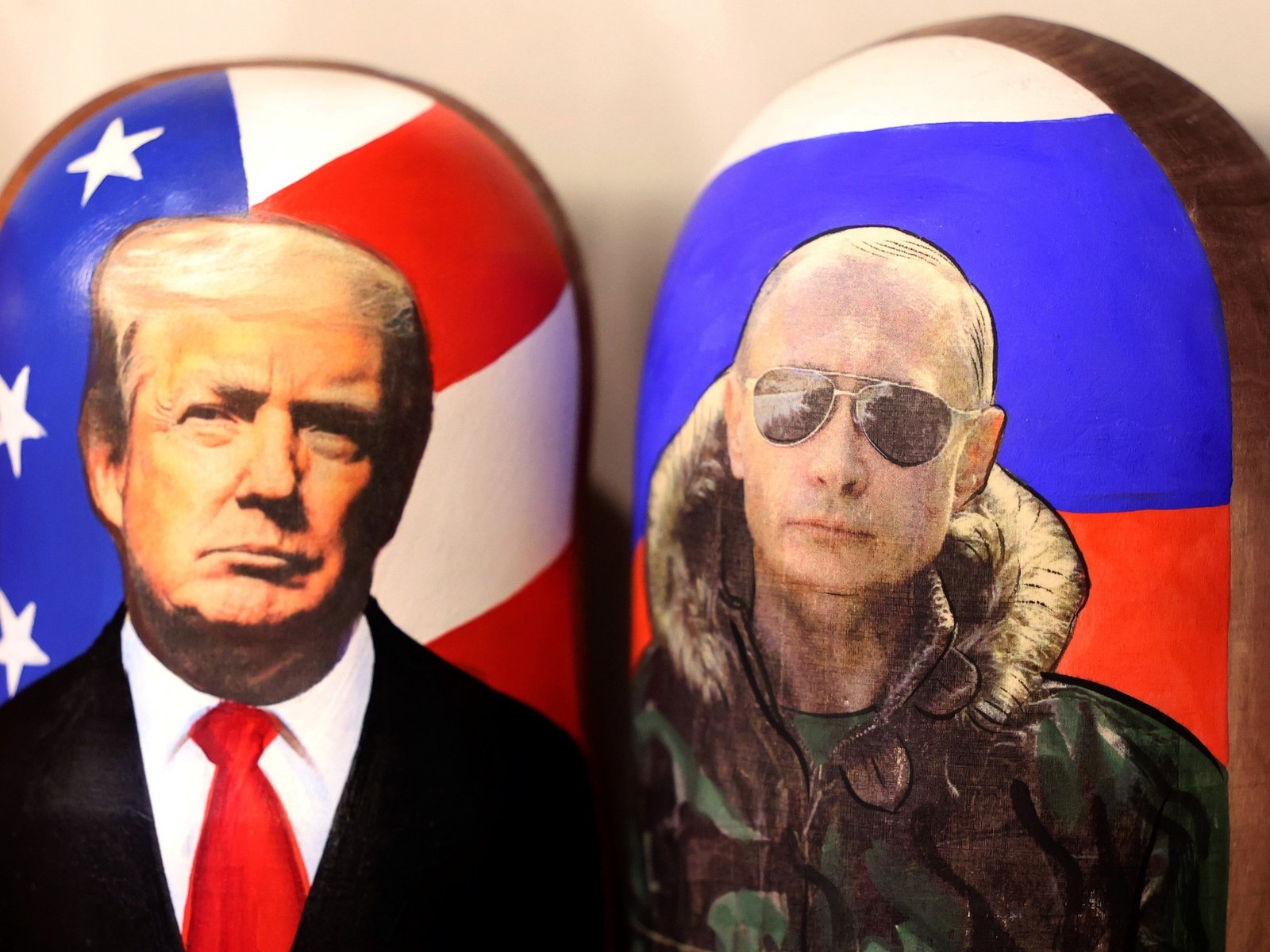
El Kremlin advirtió este lunes a Estados Unidos que «en una guerra nuclear no puede haber vencedores» después de que el presidente de EE.UU., Donald Trump, anunciara el despliegue de dos submarinos nucleares en respuesta a una supuesta amenaza rusa.
«En una guerra nuclear no puede haber vencedores. Este es, seguramente, el principal postulado por el que nos guiamos«, dijo Dmitri Peskov, portavoz presidencial, en su rueda de prensa telefónica diaria, en la que llamó a la cautela al hacer declaraciones sobre los arsenales nucleares.
Ésta es la primera reacción rusa al anuncio el pasado viernes del líder estadounidense, que no precisó la zona de emplazamiento de los submarinos.
Peskov subrayó que Moscú no considera que ahora tenga lugar entre ambas potencias «alguna clase de escalada» nuclear, por lo que «no nos gustaría vernos involucrados en tal polémica».
«Está claro que se trata de sustancia muy compleja y sensible que, por supuesto, es percibida por muchos de manera impulsiva», dijo.
En cambio, añadió, Rusia, cuya postura al respecto es responsable, opina que «todos deben ser muy cuidadosos en relación con la retórica nuclear».
«Los submarinos nucleares estadounidenses siempre están en alerta, es algo constante», comentó.
Trump ordenó el pasado viernes desplegar dos submarinos nucleares ante lo que considera las «provocadoras declaraciones» en las redes sociales del expresidente ruso Dmitri Medvédev, quien advirtió de una posible guerra entre ambos países.
«He ordenado el despliegue de dos submarinos nucleares en las regiones correspondientes, por si acaso estas declaraciones insensatas e incendiarias fueran más allá», declaró en la plataforma Truth Social.
El mandatario republicano agregó en su mensaje: «las palabras son muy importantes y, a menudo, pueden tener consecuencias imprevistas; espero que este no sea uno de esos casos».
Medvédev criticó la pasada semana el ultimátum que Estados Unidos le impuso a Rusia para que detenga la guerra de Ucrania y advirtió que éste podría derivar en un conflicto entre ambos países.
«Trump está jugando al juego de los ultimátum con Rusia: 50 o 10 días… Él debería recordar dos cosas. Primero: Rusia no es ni Israel ni incluso Irán. Y segundo: cada nuevo ultimátum es un paso hacia la guerra. No entre Rusia y Ucrania, pero con su propio país», escribió el lunes en su cuenta de X.
Trump’s playing the ultimatum game with Russia: 50 days or 10… He should remember 2 things:
1. Russia isn’t Israel or even Iran.
2. Each new ultimatum is a threat and a step towards war. Not between Russia and Ukraine, but with his own country. Don’t go down the Sleepy Joe road!— Dmitry Medvedev (@MedvedevRussiaE) July 28, 2025
El actual subjefe del Consejo de Seguridad de Rusia añadió poco después en Telegram: «Que recuerde sus películas favoritas sobre ‘Muertos vivientes’ y también qué peligroso puede ser la ‘mano muerta’».
El sistema ruso «Perímetro», también conocido como «Mano muerta», se activaría en caso de que el Kremlin pierda el control sobre su arsenal nuclear debido a un ataque masivo enemigo.
Después de expresar en varias ocasiones su decepción con el presidente ruso, Vladímir Putin, Trump redujo a 10 días el plazo para que éste detenga la guerra, so pena de sanciones y aranceles secundarios a los que importen petróleo ruso.
En medio de las tensiones entre Moscú y Washington por la falta de un acuerdo para una tregua en Ucrania, Trump confirmó el domingo que su enviado especial Steve Witkoff visitará Rusia la próxima semana, antes de la inminente fecha límite del ultimátum de 10 días so pena de sanciones.
En declaraciones a periodistas, Trump dijo que Witkoff visitaría Rusia «creo que la próxima semana, el miércoles o el jueves».
Putin ya se ha reunido con Witkoff en varias ocasiones en Moscú, antes de que los esfuerzos de Trump por reparar las relaciones con el Kremlin se detuvieran por completo.
Cuando los periodistas le preguntaron cuál sería el mensaje de Witkoff a Moscú y si había algo que Rusia pudiera hacer para evitar las sanciones, Trump respondió: «Sí, llegar a un acuerdo para que dejen de morir personas».
Trump ya había amenazado anteriormente con que las nuevas medidas podrían suponer «aranceles secundarios» dirigidos a los socios comerciales que le quedan a Rusia, como China e India. Esto ahogaría aún más a Rusia, pero supondría un riesgo de perturbación internacional significativa.
Pese a la presión de Washington, la ofensiva de Rusia contra su vecino prooccidental sigue su curso.
Donald Trump,Rusia,Estados Unidos

 POLITICA3 días ago
POLITICA3 días agoCristina Kirchner cruzó a Milei por la corrida cambiaria: “Lo único que se te ocurre es echarles la culpa a los ‘kukas’”

 POLITICA3 días ago
POLITICA3 días agoMilei interrumpió la nota con Fantino para firmar un decreto: avaló contrarreloj una suba a estatales y residentes del Garrahan

 POLITICA3 días ago
POLITICA3 días agoMurió el general Carlos Laidlaw, un militar dedicado a la estrategia y la geopolítica













